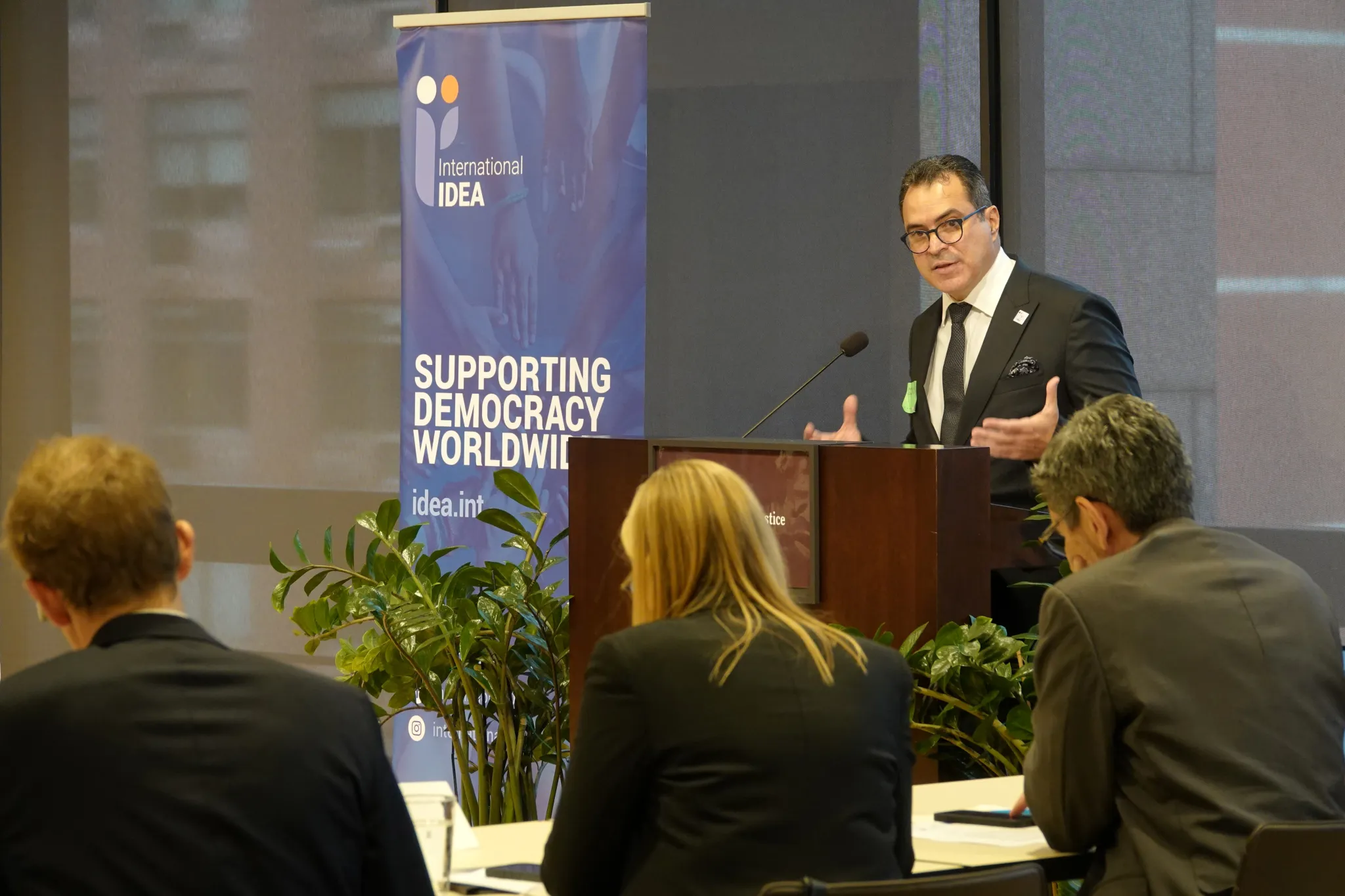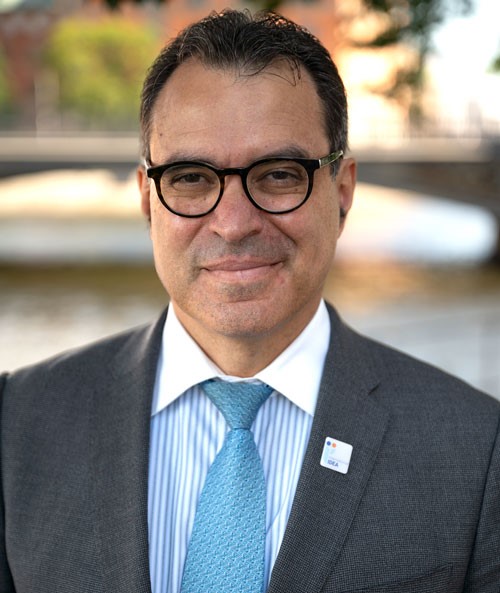UNGA High-Level Event: Support for Democracy in a New Geopolitical Context

Excellencies, colleagues, and friends
Good afternoon.
Thank you all for being here. I feel a deep debt of gratitude to the Member States of International IDEA and the like-minded countries in attendance, to our colleagues from philanthropy and civil society, and to our event partners—Ford Foundation, IDRC, and the Transparency, Accountability and Inclusion Collaborative. I want to extend special thanks to our co-sponsors: Switzerland, Chile, South Africa, Mongolia, Estonia, Ghana, and Canada, all Member States of International IDEA. Switzerland, moreover, is the Chair of our Council of Member States this year, and a wonderfully supportive Chair, I must add.
In these initial remarks, I want to do two things. First, I will set out the context for our conversation. And second, I’ll outline the rest of the event.
This year, as the United Nations marks 80 years, International IDEA is celebrating its 30th anniversary. For both organizations, these milestones invite us to look back as well as forward.
In the case of International IDEA, our Institute was founded in a time of optimism for democracy. The world is very different today. As I speak, democracy is facing the strongest headwinds in our lifetimes. Threats to freedom, human rights, and the rule of law are proliferating around us. International IDEA’s Global State of Democracy indices show that 2024 was the ninth consecutive year that more countries declined rather than improved in overall democratic performance. This is the longest consecutive fall since our records began in 1975.
In response, International IDEA is working with our Member States and partners to identify and monitor threats to democracy, but also to tease out the best examples from all over the world of how to counter them. Most of all, we are working to support those that are on the frontlines of democracy, resisting against authoritarian pressures but also reforming democratic systems to make them fairer and more inclusive.
How we conceive of and deliver that support to democratic actors is a crucial question today. Because the truth is that, despite democracy’s travails, support for the task of defending democracy is waning. The whole enterprise is being challenged from all ends.
On the one hand, the countries that did so much to enable the global spread of democracy and prosperity are losing interest and, in fact, are busy dismantling some of the key levers of that success. The demise of USAID and the drastic reduction of democracy assistance budgets elsewhere will make the advance of democracy and development more difficult in the future.
On the other hand, the traditional models to support democracy, North-funded and most often than not North-driven, are increasingly resisted by their erstwhile beneficiaries, who often came to see them as patronizing and intrusive in their own affairs.
One would hope, however, that those countries would not simply object to and feel resentment about those efforts to support democracy and would, on the contrary, come forth with their own ideas to advance the global democratic cause. But, for the most part, that’s not what is happening.
You see, I come from the so-called Global South, and I strongly feel that protecting the immense human achievement that is democracy is our responsibility too. Around this table, there are proud democracies from Latin America, Africa and Asia, in many cases born from long struggles for self-determination. You are living proof that democracy is not a Western construct, but a universal aspiration. I ask my fellow democrats from the Global South – What is it that we’re willing to say and do to support those struggling to realize that dream in so many places, including in the North? Are you at least willing to support platforms where you can share your unique experiences in building democratic institutions with other people striving to create or make them better in their own countries?
In my view, creating those platforms and opportunities for a truly horizontal and plural dialogue, for inclusive and respectful processes of peer-to-peer learning, is a big part of what we need to do to support democracy in the future. In his autobiography, the great Amartya Sen remarked that when we learn about each other we build knowledge, and we also build peace. That’s what this is about. And this is where I would like International IDEA to go.
This is not the only way in which we should go back to the drawing board, at least in the case of International IDEA. For three decades our work to advance democracy has focused, say, 20 per cent on the demos and 80 per cent on the kratos. For legitimate reasons, we continue to give priority to supporting institutional actors like electoral commissions, parliaments, constitutional courts and so on. How can we protect electoral integrity, for example, which is one of the truly crucial tasks of the day, if we don’t work closely with electoral authorities?
Yet, it is imperative that we look ourselves in the mirror. Our own reports show that, despite our best efforts, the performance of representative institutions worldwide continues to decline, while that of rule of law institutions is not getting better. Legitimate questions about the impact of our institutional work ought to be asked.
What we do know, also from our reports, is that civic activism continues to thrive in most places. It is the one element of democracy that remains robust. As far as I can tell, it is in civic activism and social movements where the energy for the renewal of the democratic project is. That drive doesn’t come from the workings of institutional actors, but from civil society. Not just that. It’s been shown that strategies against democratic backsliding are far more successful when they involve broad-based social coalitions. When democracy’s chips are down, protecting civil society actors, independent journalists, and brave activists may be the best way to preserve the civic tissue that allows a democratic society to resist the authoritarian onslaught and live another day.
What I’m saying here is that, at least in our case, we may be due for a rebalancing between the demos and the kratos in our work. Supporting broad based civic coalitions is not nearly enough if we want to build lasting democracies, but it is a lot if we want to protect democracies against gale-force winds. And protecting democracy should be a priority going forward. Lending more support to the demos is also where International IDEA is already headed, for example by establishing and coordinating the Global Democracy Coalition, generously funded by the Ford Foundation.
These are only a few ideas to ignite today’s discussion. What these musings amount to is the realization that only inclusive exchanges—with countries from all over the world, and actors that are both institutional and anchored in civil society—will generate the ideas, opportunities, and solutions we need to protect and revitalize democracy in this challenging time.
Our discussion here will thus be guided by two central questions:
First, how can we sustain and improve democracy support in the new global context, including in the multilateral system?
The second question, for all of you present here from Member States, philanthropy, and civil society, is what role are you willing to play to champion democratic values?
We will start answering these two big questions with a panel featuring perspectives from the International IDEA Member States that are co-sponsoring this event, as well as my good friend Thomas Carothers, from the Carnegie Endowment for International Peace and one of the world’s leading thinkers on democracy.
We will then open the floor for interventions from other IDEA and UN Member States, from philanthropies that are playing a key role in the democracy space, and from civil society and intergovernmental partners. I look forward to an active and productive exchange.
Look around you. The faces here are visible proof that democratic values are not tied to national identities, religious creeds or ethnic traits. To the contrary, these values speak to very profound aspirations in all human beings. My hope is that we will all leave today with a revitalized commitment, a sense of shared purpose, and a new network to support democracy. You can count on International IDEA as your partner in that endeavour.
Thank you.
